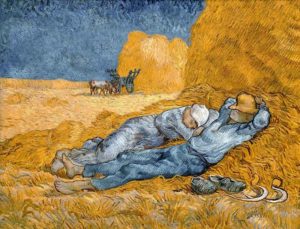Loanwords and an ode to siestas

The Siesta – Vincent van Gogh (1889-90)
The Oxford English Dictionary defines a loanword as “a word adopted from a foreign language with little or no modification”. Examples of these are “déjà vu” in English (from French), “marketing” in Spanish (from English) and “le weekend” in French (also from English). Due to their form, these are obviously loans from foreign languages; however, other examples are so entrenched that their origin is far from obvious. A perfect instance is the word “pyjamas” (or “pajamas” in the US) which came to English from Hindi – पैजामा (pāy–jāma) – which in turn borrowed the word from the Persian پايجامه.
Talking of pyjamas…
There are many Spanish loanwords in English, including “breeze”, “patio” and “cargo”, but my favourite has to be “siesta”. Working from home for the past 16 years, I have become a great aficionado (another Spanish loanword), following the advice of the great writer Camilo José Cela who recommended the full version, “in pyjamas, saying your prayers beforehand”, as opposed to five minutes with your eyes shut on the sofa and the TV on in the background.
A recent article in The Guardian told of Vijai Sardesai, the leader of India’s Goa Forward party who has pledged that if elected as Chief Minister in forthcoming State elections he will make siestas – to last an hour, taken between 1 pm and 4 pm – compulsory. He argues that this healthiest of habits improves the memory and alertness and reduces the risk of a heart attack.
He’d get my vote!
https://www.theguardian.com/world/2020/dec/06/goa-party-leader-hopes-to-swing-the-siesta-vote
Préstamos lingüísticos y oda a la santísima siesta

La siesta – Vincent van Gogh (1889-90)
La RAE define préstamo lingüístico como “elemento, generalmente léxico, que una lengua toma de otra”. Como ejemplos podemos citar “marketing” en castellano y catalán (del inglés) “déjà vu” en inglés (del francés) y “le weekend” en francés (también del inglés). Debidas a su ortografía, es evidente que se han tomado estas palabras de otras lenguas; sin embargo, hay otras tan arraigadas que sus orígenes no son nada obvios. Un ejemplo perfecto es la palabra “pijama” cuya procedencia es del hindi – पैजामा (pāy–jāma) – idioma que, a la vez, la tomó prestada del persa پايجامه.
Y hablando de los pijamas…
Hay muchas palabras españolas prestadas en el inglés, que incluyen breeze (“brisa”), “patio” y “cargo”, sin embargo mi favorita ha de ser “siesta”. Como llevo 16 años trabajando desde casa, me he convertido en gran aficionado (otra palabra que el inglés ha tomado del castellano) de la santísima siesta. Sigo a rajatabla los consejos de Camilo José Cela que abogó por la versión completa, “con pijama, Padrenuestro y orinal” en lugar de la corta, de cinco minutos en el sofá con la tele como trasfondo.
Un artículo reciente en The Guardian contó la historia de Vijai Sardesai del partido político Goa Forward que ha prometido que, una vez elegido Primer Ministro en las próximas elecciones del Estado de Goa, India, la siesta – de duración mínima de una hora y tomada entre las 13h y las 16h – será obligatoria. Argumenta que esta sanísima costumbre mejora la memoria y la atención y reduce el riesgo de sufrir un ataque cardíaco.
¡Tendría mi voto!
https://www.theguardian.com/world/2020/dec/06/goa-party-leader-hopes-to-swing-the-siesta-vote
Ali says:
He’d get mine too! Greatest ever Spanish invention!
Cata says:
How is breeze a loan word? Don’t you suppose to maintain the original form when it’s a loaned word?
William Pairman says:
Great question Cata, very interesting! I would say that a loanword doesn’t always have to keep the original spelling. So for example with English loanwords in Spanish, somethimes they do – like marketing above, sometimes they don’t and adapt the spelling to more standard Spanish, like meeting > mitin. There other examples where the adapted form has dropped out of use over time and the original prevails, like orsay > offside and güisqui > whisky
Similarly, in English ideally déjà vu should maintain its French accents (although these are commonly ignored these day, as with façade > facade), but in other cases the word has become more “anglified”, as with breeze as you mention.
Ruth says:
Interesting! There are lots if loanwords in Arabic… for example, shower… as a verb said with an Arabic accent “Ashawwwaa” means I shower, or “batshawwwaa” meaning you shower. Used as verbs these loanwords are largely unrecognisable unless you know what they mean!
Heather says:
What about northern Irish version pawrshawr, meaning to power shower? 😅